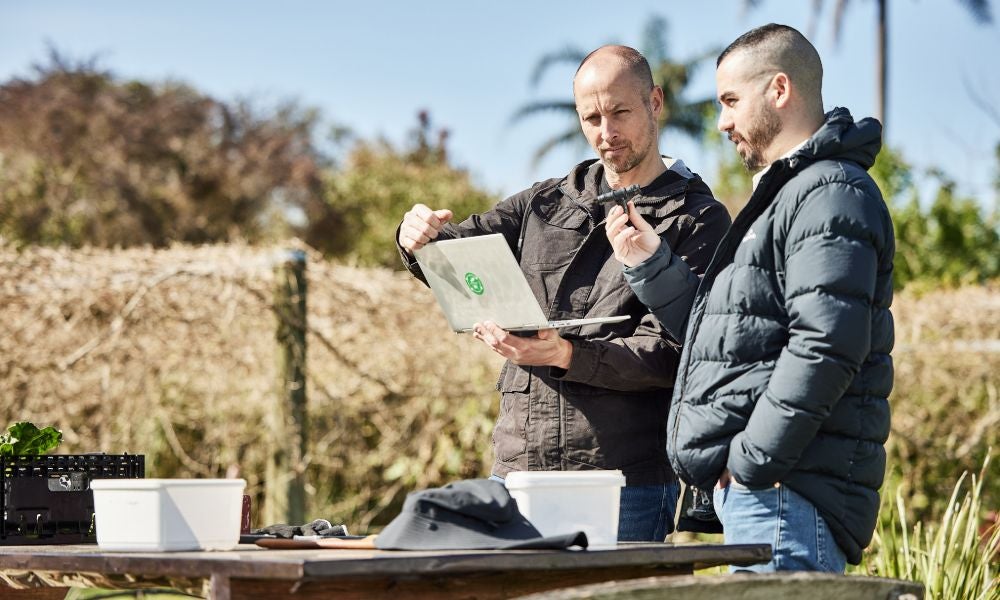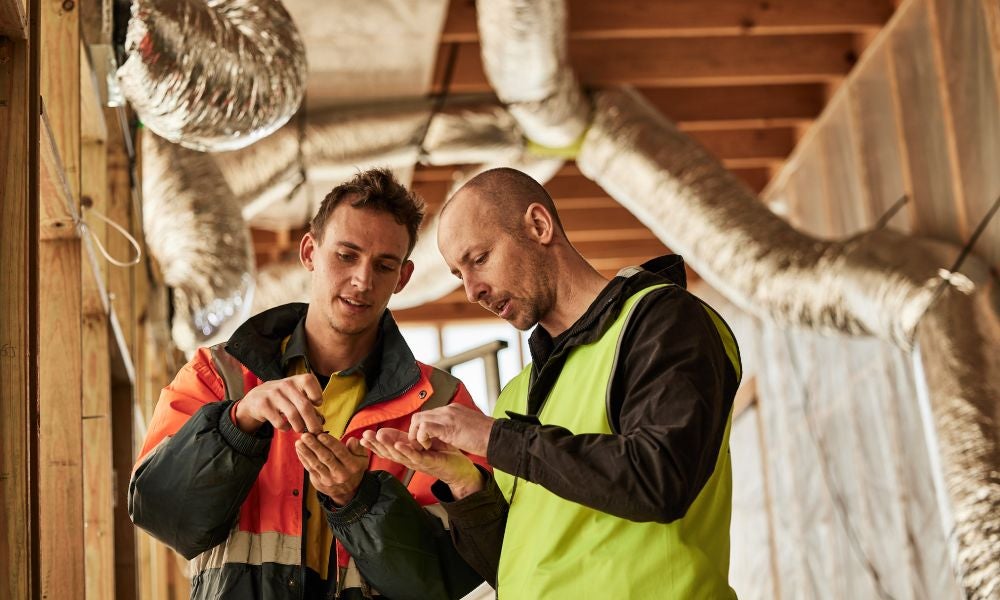From waste to resource: Behind David Sivyer's circular food solution
David Sivyer, MD of Feedback Organic Recovery and AGSM MBA (Executive) alumnus, is innovating urban farming by turning food waste into valuable resources
Australia discards approximately 7.6 million tonnes of food waste annually, costing the economy a staggering $36.6 billion. This waste doesn't just represent lost economic value – it contributes significantly to greenhouse gas emissions, exacerbating climate change. While policymakers, businesses, and consumers grapple with this escalating challenge, innovative solutions are urgently needed.
David Sivyer, Managing Director of Feedback Organic Recovery and AGSM MBA (Executive) candidate at UNSW, sees this waste as an opportunity. His mission is clear: transform how urban Australia handles food waste by creating circular economy solutions that benefit communities, businesses, and the environment.
“This project started as an experiment in 2013 and quickly had to become commercially viable. A key learning for me, one I learned too late, was to collaborate as early as possible. Partnering with others and finding alignment were critical. It helped us grow, and now we’re a DGR-registered nonprofit, which is really cool,” he says.
Connecting cities to circular food systems
Mr Sivyer is a fifth-generation farmer who grew up on his family's property in the Barrington Tops, New South Wales. His career in hospitality initially exposed him to the scale of food waste. “I pursued a career in business and studied business, and then started a role in hospitality. And that ultimately exposed my, or just gave me some great exposure to the incredible amount of food waste, which is something which is still pretty prevalent,” he says.
Driven by a passion for sustainability and regenerative agriculture, he started Feedback Organic Recovery in 2013, initially as a modest experiment aimed at converting food waste into nutrient-rich compost. “It was fascinating to see that combination of food waste and a farming background, and think: how can we utilise this as a resource instead of waste? We started experimenting and created Feedback Organic. It’s all about collecting food waste and converting it into a resource – nutrient-rich compost, or through partnerships, fertiliser and frass, which is this fantastic black soldier fly output,” he says.
The not-for-profit generates revenue by converting urban food waste from businesses, schools, and universities into compost, fertiliser, and insect-based frass using black soldier fly larvae. Most income comes from waste management fees, partnerships, and educational programs demonstrating circular food systems.
Learn more: From e-waste to innovation: The story of a circular economy entrepreneur
Since its launch, the social enterprise has quickly evolved. Recognising that real change required directly engaging communities and businesses, Feedback Organic has created urban farms in city spaces, fed by composted food waste. These farms became vibrant platforms for experiential education, drawing in corporate groups, schools, and policymakers to see the power of circularity firsthand.
“It was about more than turning waste into compost,” Mr Sivyer explains. “It was seeing how that encouraged hands-on experience and brought people together from completely different sectors (corporates, schools, businesses, and universities) in a cross-sector approach.”
“Having farms in cities where we converted food waste on a commercial scale was a real turning point. It showed the power of physical connection and immersive engagement in urban food systems, creating a shared purpose around closing the food loop.”
Scaling impact through technology and policy
Today, Mr Sivyer is expanding Feedback Organic’s impact through technology and collaboration. The next phase includes a digital co-design platform that allows diverse stakeholders, from local governments to businesses, to develop innovative solutions collaboratively addressing food waste and urban sustainability.
“We want to create spaces online where all of this type of co-design for new ideas can really be fostered and funded and also uniquely implemented,” Mr Sivyer says. "If there is a commercial platform or a commercial idea that comes out of it, we'd love to make sure that they either get a return or some type of remuneration in any form."

Advancements in bioconversion technology are also becoming increasingly important. Mr Sivyer highlights the importance of innovative methods like those using black soldier fly larvae, describing them as remarkable due to their ability to process food waste, including contaminated waste, efficiently.
“The larvae are amazing because they actually eat around the plastic,” Mr Sivyer explains. “One will come out with plastics itself, one will come out with the frass, which is the fertiliser, or the poop of the fly, for example, and then also the actual larvae themselves. And they all have different value adds from it."
Encouragingly, this technology dovetails with recent supportive regulatory changes. For example, the NSW Environmental Protection Authority's new commercial food waste mandate, scheduled to be implemented in July 2026, will require significant waste reduction from businesses, catalysing broader adoption of sustainable waste management practices.
Reimagining agricultural value
Reducing food waste is a complex challenge heavily influenced by household behaviours and individual choices, which are shaped by attitudes towards food; therefore, targeted interventions that encourage behaviour change at the household level are essential, alongside opportunities to redistribute surplus food to people in need and repurpose potential food waste into valuable products.
Beyond technological innovation, Mr Sivyer emphasises the need to rethink agricultural value chains and consumer behaviours critically. This is especially important considering that households generate the most food waste in Australia as a sector. Households are responsible for about 30% of all food waste, roughly 2.5 million tonnes per year, which costs each household up to $2500.
Subscribe to BusinessThink for the latest research, analysis and insights from UNSW Business School
Mr Sivyer argues that fundamentally transforming how society interacts with food and addresses food waste requires systemic change driven from the top. To achieve a significant impact, he calls for more robust policy interventions designed to incentivise sustainable practices, ensuring these become accessible and affordable to all consumers, not just those who can afford to pay higher grocery prices. Sustainable sourcing, he stresses, must be inclusive rather than exclusive.
“Policy change would be great – creating new policy or tweaking elements of [existing] policy around the EPA food waste mandates – that’s an example of amazing policy change,” Mr Sivyer insists.
“It's also linked to food security, or food insecurity. How do we ensure that this is equitable for all? Especially as consumers become more aware and want transparency, those products might not always be available to everyone. It's a process. It doesn't necessarily have to be more costly for those more consumer-aware products.
“That's where policy, incentives, and subsidies come in, making that type of production accessible for everyone. You need to create regulatory changes, and hopefully, we can all contribute to that,” he says.

Mr Sivyer credits his AGSM MBA (due to graduate in 2025) with equipping him with strategic tools and frameworks, such as stakeholder mapping and systems thinking, necessary to effectively scale Feedback Organic’s impact. He believes these methodologies empower leaders to articulate complex sustainability strategies clearly and drive meaningful change.
His advice to emerging leaders and entrepreneurs? “Start small and tangible, like take your ideas off the whiteboard and into the real world pretty quickly – getting ideas out there, having a really clear vision around what it's expected to be, maybe putting together an MVP as well, like a prototype.”
He emphasises the importance of resilience, adding: “And always being transparent and communicating well with whoever you're working with creates that lasting connection with whoever it is, whether it's your customer or your partnerships.”
